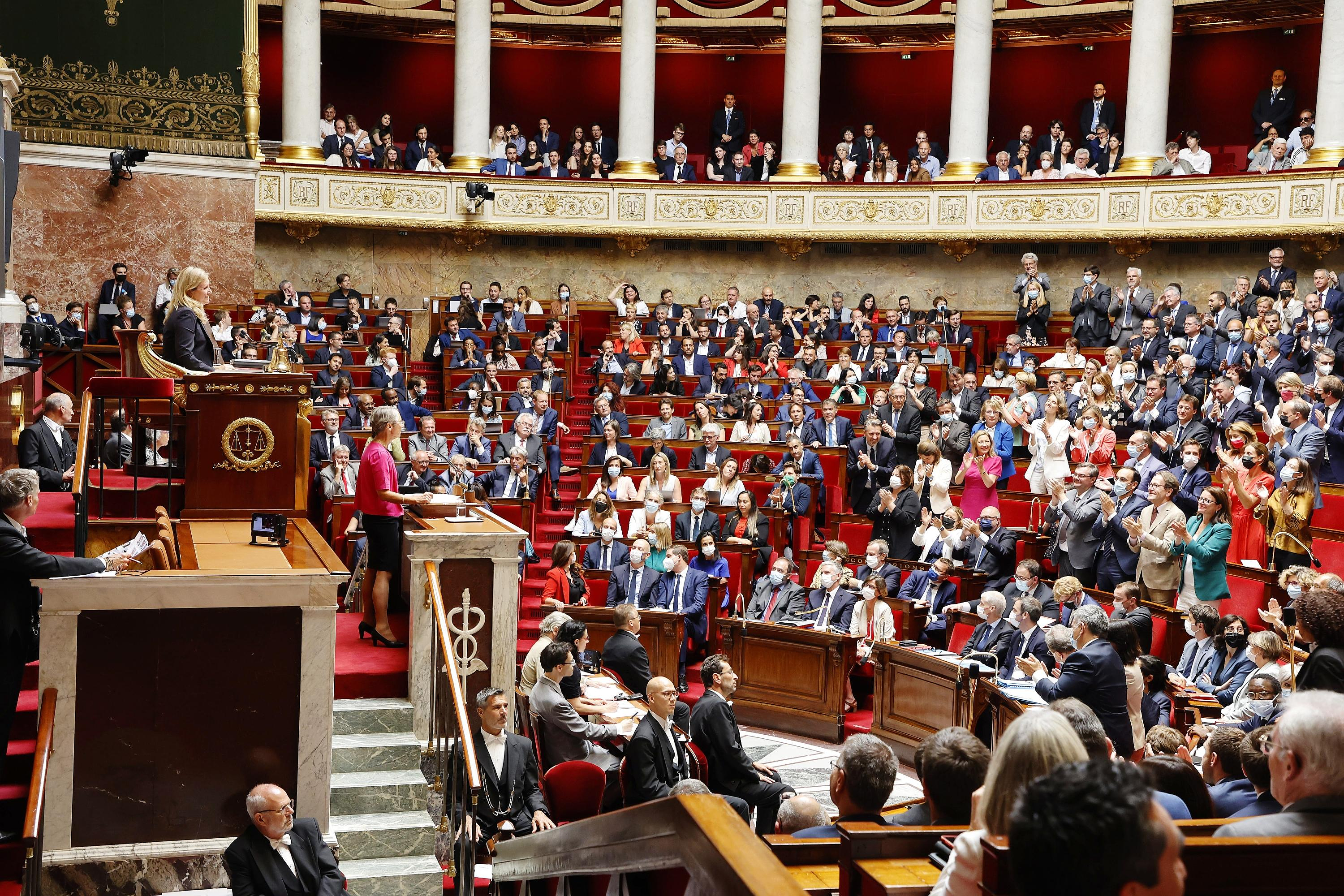Rome
The European recovery plan which was to be a tremendous opportunity for Italy, with 191 billion in loans and grants from Europe, would it be turning into a nightmare for the government of Giorgia Meloni? While Rome has already submitted its change requests to Brussels several times, Vincenzo Smaldore, who is closely following his execution for Openpolis, a public spending monitoring platform, does not mince his words: "The Italian plan has failed, and the government not being able to achieve the objectives that had been set in agreement with Europe, it is seeking to change it radically.”
Already on May 25, the Court of Auditors had sounded the alarm about the poor execution of the expenditure planned under the plan: from January 1 to May 12 of this year, 1.15 billion euros were spent out of the 33 .8 billion planned for 2023. This criticism has earned the bearer of bad news to have his power to control the progress of projects as they are carried out removed by a vote in Parliament. From now on, the court will no longer control expenditure until the work is completed.
Alarmed, the Brussels Commission spokesperson recalled that the plan “requires an adequate control framework commensurate with its unique nature as a results-oriented spending programme”. And that it “is the responsibility of the Italian authorities to ensure that these (control) bodies can function”. Giorgia Meloni immediately replied that she was only taking over the mode of a posteriori control planned by the Draghi government in May 2021, and that the concomitant control of the court inhibited elected officials. Clearly, if there are delays, it is because of… the Court of Auditors.
This muzzling as a rule arouses the ire of the opposition, but also of the magistrates of the Court of Auditors, starting with its prosecutor, Angelo Canale: "While this is an unprecedented public investment, and in very short deadlines, the European architecture of the plan requires the States to take all measures both to control the regularity of expenditure and to encourage corrective action in the event of waste or diversion. It is a specific obligation. Without us, who controls? Who guarantees that public money is not wasted?
“The objective of the concomitant control was to highlight possible shortcomings in the functioning of the administrative machine”, also explains the former national anti-Mafia prosecutor Federico Cafiero De Raho, who fears the infiltration of corruption.
Be that as it may, muzzling the Court of Auditors will not solve the many problems. “Italy will have spent only 25 billion to date, instead of the 65 billion planned for this phase (2021-2023), explains Vincenzo Smaldore. This delay is no longer recoverable today”. In total, the plan for the recovery and resilience of Italy, which obtained the formal green light from the Commission in June 2021, covers an envelope of 191.5 billion, including 122.6 billion in loans, the rest from grants.
Italy is the first beneficiary among the Member States, ahead of Spain, of this major aid plan of 750 billion euros put in place after the pandemic.
While since its arrival in October, the Meloni government has centralized guardianship of the plan in Palazzo Chigi without publishing anything on its execution, it presented its first report on May 31. Which in hollow draws up an alarming state of progress. From which it appears that 59% of the funds were spent on measures unrelated to the plan (including 8.7 billion in the ecobonus). That 48 billion major public works projects are on hold. That in order to move forward on certain projects, the administrations have sacrificed the major cross-cutting objectives set by the Commission, such as the place of women in the economy, that of young people and the development of the South. From which it also emerges that the ReGis computer system which must centralize all the data on the plan being defective, the government itself lacks reliable information on what is really being implemented.
Because both central and local administrations, particularly in the South, are all in difficulty. The management of calls for tenders turns into a headache, the civil servants cannot manage it, and are sorely lacking in technical expertise capable of coordinating the various administrations. The 500 or so “Draghi boys” recruited on fixed-term contracts to manage the plan are themselves leaving the ship, for lack of prospects.
Also the Italian government, which is already struggling to obtain the third tranche of 19 billion euros for the second half of 2022, has decided to give up requesting the fourth of 16 billion at the end of the month. "While it fails to spend the 60 billion that was planned to date, and that it fails to meet the conditions set, the government of Giorgia Meloni wants to put everything back together with Brussels, define both a new contract, new objectives, and a new calendar, explains Vincenzo Smaldore. But that supposes that it can lead a real political confrontation with Europe and that it is able to deliver a real strategic vision. Answer at the end of August?

 Who was Dror Or, the Israeli father who died as a hostage in the hands of Hamas?
Who was Dror Or, the Israeli father who died as a hostage in the hands of Hamas? “Pay in cash”: at his trial, Donald Trump faced with an embarrassing recording
“Pay in cash”: at his trial, Donald Trump faced with an embarrassing recording Italy: a grandmother accidentally serves a bottle filled with wine to a baby, he has an alcoholic coma
Italy: a grandmother accidentally serves a bottle filled with wine to a baby, he has an alcoholic coma The mysterious skeletons of Hermann Göring's villa
The mysterious skeletons of Hermann Göring's villa Children born thanks to PMA do not have more cancers than others
Children born thanks to PMA do not have more cancers than others Breast cancer: less than one in two French women follow screening recommendations
Breast cancer: less than one in two French women follow screening recommendations “Dazzling” symptoms, 5,000 deaths per year, non-existent vaccine... What is Lassa fever, a case of which has been identified in Île-de-France?
“Dazzling” symptoms, 5,000 deaths per year, non-existent vaccine... What is Lassa fever, a case of which has been identified in Île-de-France? Sánchez cancels his agenda and considers resigning: "I need to stop and reflect"
Sánchez cancels his agenda and considers resigning: "I need to stop and reflect" Health carpooling, this source of savings which arouses the ire of patients and taxis
Health carpooling, this source of savings which arouses the ire of patients and taxis Tesla Model 3, MG4 and Dacia Spring.... With the end of the ecological bonus, these electric cars produced in China are seeing their sales fall
Tesla Model 3, MG4 and Dacia Spring.... With the end of the ecological bonus, these electric cars produced in China are seeing their sales fall For the 2024 Olympics, Airbnb commits to fighting prostitution in its accommodation
For the 2024 Olympics, Airbnb commits to fighting prostitution in its accommodation “Shrinkflation”: supermarkets obliged to alert their customers from July 1
“Shrinkflation”: supermarkets obliged to alert their customers from July 1 The electro of Justice and the echoes of Portishead
The electro of Justice and the echoes of Portishead 1924 Olympic Games: according to his daughter, the hero of Chariots of Fire was “not a bigot”
1924 Olympic Games: according to his daughter, the hero of Chariots of Fire was “not a bigot” The “German Brothel” in Yvelines: an uncertain future for the ruined residence
The “German Brothel” in Yvelines: an uncertain future for the ruined residence The eye of the INA: when Paul Auster visited Bernard Pivot
The eye of the INA: when Paul Auster visited Bernard Pivot Omoda 7, another Chinese car that could be manufactured in Spain
Omoda 7, another Chinese car that could be manufactured in Spain BYD chooses CA Auto Bank as financial partner in Spain
BYD chooses CA Auto Bank as financial partner in Spain Tesla and Baidu sign key agreement to boost development of autonomous driving
Tesla and Baidu sign key agreement to boost development of autonomous driving Skoda Kodiaq 2024: a 'beast' plug-in hybrid SUV
Skoda Kodiaq 2024: a 'beast' plug-in hybrid SUV The home mortgage firm rises 3.8% in February and the average interest moderates to 3.33%
The home mortgage firm rises 3.8% in February and the average interest moderates to 3.33% This is how housing prices have changed in Spain in the last decade
This is how housing prices have changed in Spain in the last decade The home mortgage firm drops 10% in January and interest soars to 3.46%
The home mortgage firm drops 10% in January and interest soars to 3.46% The jewel of the Rocío de Nagüeles urbanization: a dream villa in Marbella
The jewel of the Rocío de Nagüeles urbanization: a dream villa in Marbella Facing Jordan Bardella, the popularity match turns to Gabriel Attal’s advantage
Facing Jordan Bardella, the popularity match turns to Gabriel Attal’s advantage Europeans: a senior official on the National Rally list
Europeans: a senior official on the National Rally list Blockade of Sciences Po: the right denounces a “drift”, the government charges the rebels
Blockade of Sciences Po: the right denounces a “drift”, the government charges the rebels Even on a mission for NATO, the Charles-de-Gaulle remains under French control, Lecornu responds to Mélenchon
Even on a mission for NATO, the Charles-de-Gaulle remains under French control, Lecornu responds to Mélenchon These French cities that will boycott the World Cup in Qatar
These French cities that will boycott the World Cup in Qatar Monaco - Clermont: Minamino cornerstone, Fofana essential, the Clermont defense overwhelmed... The tops and the flops
Monaco - Clermont: Minamino cornerstone, Fofana essential, the Clermont defense overwhelmed... The tops and the flops Gymnastics: two gold medals for the Italian Manila Esposito during the European Championships
Gymnastics: two gold medals for the Italian Manila Esposito during the European Championships Champions Cup: in pain, Leinster beats Northampton and qualifies for the final
Champions Cup: in pain, Leinster beats Northampton and qualifies for the final Liga: Real Madrid crowned champion of Spain after FC Barcelona's defeat in Girona
Liga: Real Madrid crowned champion of Spain after FC Barcelona's defeat in Girona


















